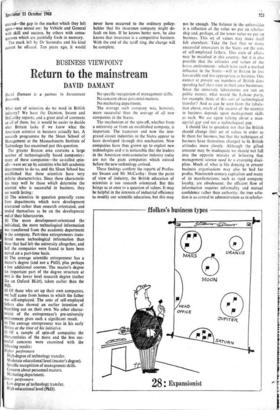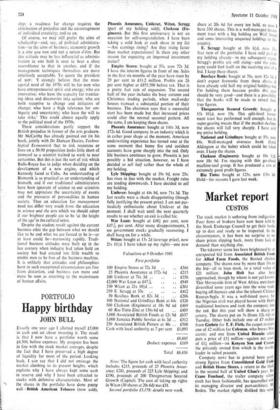Return to the mainstream
BUSINESS VIEWPOINT DAVID DAMANT
David Damant is a panne, in Investment Research.
What sort of scientists do we need in British industry? We have the Dainton, Swann and McCarthy reports, and a great deal of comment on all of them, but it would be easier to decide what Britain lacks if we knew what the American scientist in business actually has. A research programme by the Sloan School of Management at the Massachusetts Institute of Technology has examined just this question.
The greater Boston area contains a large number of technologically based companies: many of these companies—the so-called spin- offs—were set up by scientists who left academic departments to do so, and the Sloan School has established that these scientists have very definite characterktics. Since these characteris- tics may well be those which determine the scientist who is successful in business, they are worth listing:
(a) The scientists in question generally came from departments which were development orientated rather than research orientated, and tended themselves to be on the development end of their laboratories.
(b) The more development-orientated the individual, the more technological information was transferred from the academic department to the company. Part-time entrepreneurs trans- ferred more technological information than those that had left the university altogether, and half the companies were found to have been started on a part-time basis.
(c) The average scientific entrepreneur has a master's degree (and not a PhD), plus perhaps a few additional courses. The master's degree (an important part of the degree structure at Nur) is the lower level research degree (rather like an Oxford BLitt), taken earlier than the PhD.
(d) Of those who set up their own companies, one half came from homes in which the father was self-employed. The sons of self-employed fathers also showed an earlier intention of branching out on their own. No other charac- teristic of the entrepreneur's pre-university environment gives such a significant result.
(e) The average entrepreneur was in his early thirties at the time of his initiative.
(I) Of a sample of spin-off companies the characteristics of the more and the less suc- cessful concerns were examined with the following results: Higher performers High degree of technology transfer.
Moderate educational level (master's degree).
Specific recognition of management skills.
Concern about personnel matters.
Marketing department. Lower performers Low degree of technology transfer. High educational level (PhD). No specific recognition of management skills. No concern about personnel matters.
No marketing department.
The average such company was, however, more successful than the average of all new companies in the States.
The mechanism of the spin-off, whether from a university or from an established company, is important. The transistor and now the inte- grated circuit industries in the States appear to have developed through this mechanism. New companies have thus grown up to exploit new technologies and it is noticeable that the leaders in the American semi-conductor industry today are not the giant companies which existed before the new technology arrived.
These findings confirm the reports of Profes- sor Swann and Mr McCarthy : from the point of view of industry, the British education of scientists is too research orientated. But this brings us at once to a question of values. It may be helpful in the interests of industrial efficiency to modify our scientific education, but this may
not be enough. The balance in the universities is a reflection of the value we put on scholar- ship and, perhaps, of the lower value we put on business. This set of values may make itself felt elsewhere. Take the fact that so many successful innovators in the States are the sons of self-employed fathers. This state of affairs may be matched in this country, but it is also possible that the attitudes and values of the home environment—which have such a marked influence in the States--will in Britain be less favourable and less appropriate to business. One cannot at present see numbers of British dons spending half their time in their own businesses. Since the university laboratories are run on public money, what would the Labour party, for example, think of this sort of technological transfer? And as can be seen from the tabula- tion above, much of the success of the scientist in business depends upon management skills as such. We are again talking about a man- agerial gap and not a technological gap.
I should like to speculate not that the British should change their set of values in order to fit them for business, but that the techniques of business have themselves changed to fit British attitudes more closely. Although the gifted amateur may be inadequate we should not fall into the opposite mistake of believing that management science need be a cramping disci- pline. Much of what is life denying in present business organisations may also be .bad for profits. Nineteenth century capitalism and many of its manifestations, such as rigid company loyalty, are obsolescent; the efficient flow of information requires informality and mutual confidence rather than authority; the true solu- tion is as central in administration as in scholar- ship; a readiness for change requires the elimination of prejudice and the encouragement of individual creativity; and so on.
Of course, we may still prefer the aims of scholarship—and, say, of political administra- tion—to the aims of business; economic growth is a sine qua non and not a raison d'être. But this attitude may be less influential as adminis- tration in one field is seen to bear a close resemblance to that in another, and if the management techniques themselves are more intuitively acceptable. To quote the president of mrr: 'I strongly believe that the man- agerial need of the 1970s will be for men who have entrepreneurial spirit and energy; who are innovative; who have the capacity for translat- ing ideas and discoveries into action; who are both receptive to change and initiators of change; who have a high tolerance for am- biguity and uncertainty; who have the will to take risks.' This could almost equally apply to the political need of the 1970s.
These considerations partly support the British prejudice in favour of the arts graduate. Mr McCarthy has already pointed out (in his book, jointly with Dr Duncan Davies, Techno- logical Economics) that to risk resources or lives on a 50-50 proposition looks little short of immoral to a scientist trained to work to near certainties. But this is just the sort of risk which Rolls-Royce has to judge when deciding on the development of a new engine, and which Kennedy faced at Cuba. An understanding of Bismarck is as practical as an understanding of bismuth, and if our traditional administrators have been ignorant of science so our scientists may not appreciate the uncertainty of events and the pressures of personalities in human society. Thus an education for management need not differ very much from the education in science and the arts which we should adopt if our brightest people are to be 'at the height of the age' in the cultural sense.
Despite the student revolt against the current business ethic the gap between what we should like to be and what we are forced to be is—or at least could be—narrowing rapidly. Tradi- tional business attitudes -were built up in the last century when indultry had taken hold on society but had created too little wealth to enable men to be free of the business machine. It is unlikely that attitudes and philosophies born in such exceptional circumstances are free from distortion, and business can more and " More be seen as returning to the mainstream of human affairs.







































 Previous page
Previous page